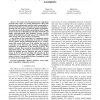21 search results - page 3 / 5 » Evaluating Security of Voting Schemes in the Universal Compo... |
FOCS
2010
IEEE
13 years 3 months ago
2010
IEEE
We construct the first general secure computation protocols that require no trusted infrastructure other than authenticated communication, and that satisfy a meaningful notion of s...
CRYPTO
2010
Springer
13 years 6 months ago
2010
Springer
Multiparty computation protocols have been known for more than twenty years now, but due to their lack of efficiency their use is still limited in real-world applications: the goal...
ECEASST
2010
13 years 1 days ago
2010
Abstract: Recently, Free and Open Source Software (FOSS) has emerged as an alternative to Commercial-Off-The-Shelf (COTS) software. Now, FOSS is perceived as a viable long-term sol...
CRYPTO
2005
Springer
13 years 10 months ago
2005
Springer
Anonymous channels are necessary for a multitude of privacy-protecting protocols. Onion routing is probably the best known way to achieve anonymity in practice. However, the crypto...
ACNS
2009
Springer
13 years 11 months ago
2009
Springer
Abstract. Two-party Secure Function Evaluation (SFE) is a very useful cryptographic tool which allows two parties to evaluate a function known to both parties on their private (sec...

